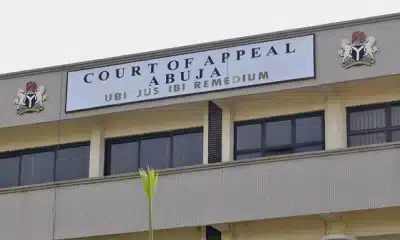Nigeria News
ECOWAS Court Rules Kano State Blasphemy Laws Violate Human Rights

The Economic Community of West African States (ECOWAS) Community Court of Justice has ruled that the blasphemy provisions in Kano State laws violate Nigeria’s international human rights commitments, especially regarding freedom of expression.
In a judgment delivered on Wednesday, the court held that the blasphemy provisions in Kano State’s Penal Code and Sharia Penal Code do not align with regional and international human rights laws.
Naija News reports that the judgment was delivered by a three-member panel consisting of Presiding Judge Ricardo Gonçalves, Sengu Koroma, and Dupe Atoki.
The case was filed by the Expression Now Human Rights Initiative (ENHRI), a non-governmental organization (NGO) in Nigeria, against the Federal Republic of Nigeria.
The organization argued that Nigeria’s blasphemy laws were causing significant human rights concerns, including arbitrary arrests, detention, and death sentences for individuals accused of blasphemy.
The court ruled that Section 210 of the Kano State Penal Code was “vague” and failed to clearly define what constitutes a religious insult, thus lacking the necessary legal precision required under international human rights standards.
Furthermore, the court criticized Section 382(b) of the Kano State Sharia Penal Code Law (2000), which imposes the death penalty for insulting the Prophet Muhammad, calling it “excessive and disproportionate” in a democratic society.
The court concluded that these legal provisions were “incompatible with Nigeria’s obligations to protect freedom of expression” under the African Charter on Human and Peoples’ Rights and the International Covenant on Civil and Political Rights (ICCPR).
The ECOWAS court ordered the Nigerian government to “repeal or amend” the identified legal provisions, as well as similar laws, to align with Article 9(2) of the African Charter.
This provision guarantees the right to freedom of expression, noting that while states have a legitimate interest in maintaining public order and respecting religious beliefs, such laws must adhere to the principles of legality, necessity, and proportionality.
The court stressed that these blasphemy laws failed to meet the established human rights tests, despite acknowledging the states’ right to regulate public order.
Failure To Prevent Blasphemy-Related Violence
The court also addressed the allegations that the state failed to prevent blasphemy-related mob violence. However, it found insufficient evidence to support these claims, explaining that media reports without corroborative evidence did not meet the required standard of proof.
The ruling comes in the wake of the case of a self-proclaimed atheist, Mubarak Bala, arrested in 2020 for blasphemy. Bala was accused of inciting religious outrage through Facebook posts critical of Islam, Allah, and Prophet Muhammad. He was sentenced to 24 years in prison in April 2022 after pleading guilty to 18 charges.
The case sparked international concern over Bala’s safety and Nigeria’s commitment to freedom of expression. His sentence was later reduced, and in January 2025, he was released after spending four years in prison.












